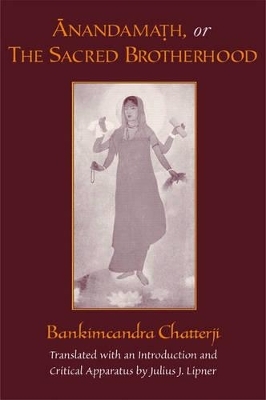
Anandamath or The Sacred Brotherhood
A Translation of Bankimcandra Chatterji's Anandamath, with Introduction and Critical Apparatus
Seiten
2005
Oxford University Press Inc (Verlag)
978-0-19-517858-6 (ISBN)
Oxford University Press Inc (Verlag)
978-0-19-517858-6 (ISBN)
Chatterji's "Anandamath" helped create the atmosphere and the symbolism for the nationalist movement leading to Indian independence in 1947. This book not only provides an English translation of this important work, but also supplies an introduction, contextualizing the novel and its cultural and political history.
This is a translation of a historically important Bengali novel. Published in 1882, Chatterji's Anandamath helped create the atmosphere and the symbolism for the nationalist movement leading to Indian independence in 1947. It contain the famous hymn Vande Mataram ("I revere the Mother"), which has become India's official National Song. Set in Bengal at the time of the famine of 1770, the novel reflect tensions and oppositions within Indian culture between Hindus and Muslims, ruler and ruled, indigenous people and foreign overlords, jungle and town, Aryan and non-Aryan, celibacy and sexuality. It is both a political and a religious work. By recreating the past of Bengal, Chatterji hoped to create a new present that involved a new interpretation of the past. Julius Lipner not only provides the first complete and satisfactory English translation of this important work, but supplies an extensive Introduction contextualizing the novel and its cultural and political history. Also included are notes offering the Bengali orSanskrit terms for certain words, as well as explanatory notes for the specialized lay reader or scholar.
This is a translation of a historically important Bengali novel. Published in 1882, Chatterji's Anandamath helped create the atmosphere and the symbolism for the nationalist movement leading to Indian independence in 1947. It contain the famous hymn Vande Mataram ("I revere the Mother"), which has become India's official National Song. Set in Bengal at the time of the famine of 1770, the novel reflect tensions and oppositions within Indian culture between Hindus and Muslims, ruler and ruled, indigenous people and foreign overlords, jungle and town, Aryan and non-Aryan, celibacy and sexuality. It is both a political and a religious work. By recreating the past of Bengal, Chatterji hoped to create a new present that involved a new interpretation of the past. Julius Lipner not only provides the first complete and satisfactory English translation of this important work, but supplies an extensive Introduction contextualizing the novel and its cultural and political history. Also included are notes offering the Bengali orSanskrit terms for certain words, as well as explanatory notes for the specialized lay reader or scholar.
Julius J. Lipner is Professor in Hinduism and the Comparative Study of Religion and Chairman of the Faculty Board of Divinity at the University of Cambridge. He is the author of several books, including Hindus: Their Religious Beliefs and Practices and Brahmabandhab Upadhyay: The Life and Thought of a Revolutionary.
| Erscheint lt. Verlag | 3.11.2005 |
|---|---|
| Übersetzer | Julius J. Lipner |
| Zusatzinfo | 2 maps, 5 halftones |
| Verlagsort | New York |
| Sprache | englisch |
| Maße | 233 x 155 mm |
| Gewicht | 467 g |
| Themenwelt | Literatur ► Romane / Erzählungen |
| Geisteswissenschaften ► Sprach- / Literaturwissenschaft ► Anglistik / Amerikanistik | |
| Geisteswissenschaften ► Sprach- / Literaturwissenschaft ► Literaturgeschichte | |
| ISBN-10 | 0-19-517858-0 / 0195178580 |
| ISBN-13 | 978-0-19-517858-6 / 9780195178586 |
| Zustand | Neuware |
| Haben Sie eine Frage zum Produkt? |
Mehr entdecken
aus dem Bereich
aus dem Bereich
Poetik eines sozialen Urteils
Buch | Hardcover (2023)
De Gruyter (Verlag)
59,95 €
Buch | Softcover (2024)
belleville (Verlag)
20,00 €


